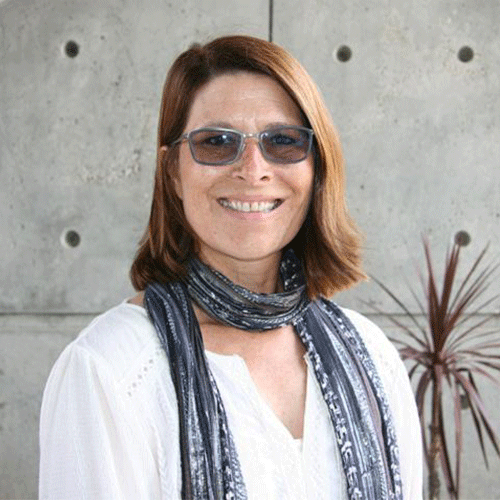Online Certificate Program
Develop the skills to design, create and evaluate effective online learning. In San Francisco State University’s E-Learning Design and Development certificate program, you’ll learn essential instructional design principles, multimedia scripting, prototyping and usability testing. You’ll also gain experience managing learning systems and authoring content for real audiences. This fully online program is designed for working professionals in education, business, government and nonprofits who want to move into instructional design or enhance their current roles.
About the Program

In the E-Learning Design and Development certificate, you will:
- Apply instructional design principles to online learning
- Write and storyboard effective scripts for multimedia lessons
- Create prototypes using current e-learning development tools
- Produce audio and video content for training and education
- Manage and publish content with learning management systems
- Conduct usability testing and evaluate e-learning products
- Develop and deploy content using industry-standard authoring software
This program is designed for:
- Professionals in corporate training, human resources, curriculum development or communications
- Employees in business, government, nonprofits or schools who need to create and deliver e-learning
- Entry- and mid-level designers, educators and managers seeking formal training in instructional design and e-learning
- Cost: $2,545 (includes course materials)
- Length: 105 hours, usually completed in 2 semesters; you may take up to 3 years
- Start Terms: Fall, spring or summer
CalJOBS
SFSU is an eligible training provider.
All classes are offered online through Canvas, the SFSU learning management system. Most courses include weekly live sessions, which are recorded for later viewing. Plan to spend 4–6 hours per week outside of class on study and project work.
Canvas: How to Access Your Online Course
Once you register and pay for your course, you may go to Canvas and log in using your SF State Login. It takes up to 24 hours to process you into the system.
Required Software
ITEC 9830: Developing Content for E-Learning requires access to Adobe Captivate. You may purchase the software or use a free 30-day trial.
About the Online Certificate

E-Learning Design and Development Curriculum (10.5 CEU)
The E-Learning Design and Development certificate includes seven courses (10.5 CEUs) that give you a solid foundation in the principles and applications of e-learning. You will gain skills in analysis, design, development and evaluation, while learning to apply design theories and technical tools across different e-learning settings. This program is designed for professionals from any field who want practical training in instructional design and e-learning.
Required Courses
You must complete all seven online courses to earn the certificate:
- ITEC 9810 Instructional Design for E-Learning
- ITEC 9815 Multimedia Production for E-Learning
- ITEC 9820 Instructional Multimedia Scriptwriting
- ITEC 9825 Adaptive Prototyping in E-Learning
- ITEC 9830 Developing Content for E-Learning
- ITEC 9835 E-Learning Evaluation and Usability Testing
- ITEC 9840 Managing Learning Systems
Core Course
ITEC 9810 Instructional Design for E-Learning is the required core course for this certificate. You must complete it, but you may take it at the same time as other program classes.
Certificate of Completion Request
Once you have completed the necessary coursework, submit the Certificate of Completion Request Form.
ITEC 9810 Instructional Design for E-Learning (1.8 CEU)
This course introduces the learner to the principles of instructional systems design (ISD), or more commonly, instructional design (ID) as they apply to e-learning development. Participants explore the complexities of designing instruction in various e-learning contexts (corporate training, education, etc.). Participants learn classic ID theory and emerging models and apply these theories in a real context through a simulated design project.
This course has two main objectives:
- Learn instructional design process and principles as applied to e-learning
- Begin developing a design plan for an e-learning project
ITEC 9820 Instructional Multimedia Scriptwriting (1.5 CEU)
This introductory course gives practicing instructional designers and serious students of instructional design a grounding in the basics of multimedia scriptwriting. In it we'll focus primarily on the process of developing script treatments, the vehicles we use as scriptwriters to first conceive and shape our visions for multimedia pieces, then formalize them for review and approval. A worksheet developed specifically for the course will help you gather your ideas and guide you to writing a script treatment based on an instructional multimedia concept of your choosing. Along the way, we'll explore many aspects of professional instructional scriptwriting practice, including: the essential steps of the scriptwriting process, the defining characteristics and production possibilities of three major presentational forms (demonstration, documentary and dramatization) and the various ways you may combine images and words to create the meanings you intend.
Course objectives:
- To improve your ability to develop effective scripts for instructional multimedia components of various types
- To improve your ability to evaluate the skills of instructional scriptwriters.
ITEC 9825 Adaptive Prototyping in E-Learning (1.8 CEU)
This course gives a brief survey and introduction to the most common e-learning development tools used in instructional design and content development. Programs such as Camtasia, Lectora and Articulate are explored. Software programs selected for demonstration are based on current industry trends and may change each term, since the e-learning industry is a quickly changing environment and the goal of this course is to give students a broad appreciation of current e-learning production methods.
The course objectives include:
- Providing an initial method by which students can implement the multimedia scripts created in the previous scriptwriting course.
- Allowing the student to create a simple portfolio of production pieces that can be built upon and customized.
- Giving the student a solid framework and comfort with rapid production methods that can be used in client presentations and stakeholder meetings.
ITEC 9815 Multimedia Production for E-Learning (1.5 CEU)
This course introduces the learner to the principles and tools for audio-visual media production as they apply to e-learning development. Participants learn how to use common equipment and free software to record audio, perform basic editing functions and process files for varying uses. Participants use several types of video capture equipment to record simple instructional videos, perform basic editing and process files for various e-learning delivery technologies. Participants also learn how to find, acquire and mix together existing audio and video media to create effective instruction material for e-learning delivery.
This course has three main objectives:
- Use basic, common audio equipment and editing software to create audio resources for e-learning delivery
- Use basic, common video equipment and editing software to create video resources for e-learning delivery
- Locate, acquire and combine audio and video resources to create effective instructional material
ITEC 9840 Managing Learning Systems (1.2 CEU)
This course surveys the issues surrounding the management of learning systems and the integration of instructional content and assessment activities. We will take both an administrative and instructional view of the best practices and challenges found when working with a learning system. We will use Moodle as our operational platform; however we will also review other learning systems, both proprietary and open source. Common technology standards are also discussed including Application Programming Interfaces (API), SCORM, Experience API and much more.
There are three objectives for the course:
- Categorize learning systems based on the needs of users.
- Provide familiarity with web 2.0 assessment tools, as well as technology and deployment standards.
- Identify the human challenges of implementing, upgrading and managing a learning system.
ITEC 9835 E-Learning Evaluation and Usability Testing (1.2 CEU)
This course emphasizes the role of formative evaluation and usability testing as an integral part of e-learning development process. Participants review Kirkpatrick's classic Levels of Evaluation and explore ways of assessing performance at each level. Special emphasis is placed on the usability testing of e-learning products. As a cumulative project for the course, students plan a study, create plans to collect and analyze data, and plan a summative report for a usability review of an existing product.
This course has three main objectives:
- Review principles of evaluation as used in instructional design
- Participate in the usability testing of real e-learning products
- Begin a usability test plan for a real or planned e-learning product
ITEC 9830 Developing Content for E-Learning (1.5 CEU)
This course explores content development for e-learning using Adobe Captivate or similar software. Students will create media rich deployable content. Common publication and packaging protocols will be discussed, including the value of learning objects, SCORM and AICC standards. This class will survey e-learning content development strategies for blended learning, training environments, screencasting, mobile computing and student accessibility.
This course has three main objectives:
- Deploy and publish content using Captivate or similar software.
- Create in-depth assessment and evaluation tools.
- Provide familiarity with publication and deployment standards
If you complete certain M.A.-level courses, you may receive credit toward this certificate by meeting the same competencies. In this case, you do not need to take the equivalent certificate course. Certificate students may choose to substitute the following M.A. courses when available:
- ITEC 9810 Instructional Design for E-Learning → equivalent to ITEC 801
- ITEC 9825 Adaptive Prototyping in E-Learning → equivalent to ITEC 865
- ITEC 9835 E-Learning Evaluation and Usability Testing → equivalent to ITEC 825
Courses are typically offered in the following semesters.
- ITEC 9810 Instructional Design for E-Learning (Core Course) – Spring/Fall
- ITEC 9815 Multimedia Production for E-Learning – Fall
- ITEC 9820 Instructional Multimedia Scriptwriting – Spring
- ITEC 9825 Adaptive Prototyping in E-Learning – Spring
- ITEC 9830 Developing Content for E-Learning – Fall
- ITEC 9835 E-Learning Evaluation and Usability Testing – Spring
- ITEC 9840 Managing Learning Systems – Fall
Brian Beatty
Dr. Brian Beatty is Associate Professor of Instructional Technologies in the Department of Equity, Leadership Studies and Instructional Technologies at San Francisco State University. Brian’s primary areas of interest and research include social interaction in online learning, flipped classroom implementation and developing instructional design theory for Hybrid-Flexible learning environments. At SFSU, Dr. Beatty pioneered the development and evaluation of the HyFlex course design model for blended learning environments, implementing a “student-directed-hybrid” approach to better support student learning.
Previously (2012–2020), Brian was Vice President for Academic Affairs Operations at San Francisco State University (SFSU), overseeing the Academic Technology unit and coordinating the use of technology in the academic programs across the university. He worked closely with IT professionals and leaders in other units to coordinate overall information technology strategic management at SFSU. Prior to 2012, Brian was Associate Professor and Chair of the Instructional Technologies department in the Graduate College of Education at SFSU. He received his Ph.D. in Instructional Systems Technology from Indiana University Bloomington in 2002. Dr. Beatty also holds several CA single-subject teaching credentials, an M.A. in Instructional Technologies from SFSU and a B.S. in Electrical Engineering from Marquette University. Dr. Beatty has more than 25 years’ experience as a classroom teacher, trainer and instructional designer at schools, businesses and the U.S. Navy.
Otaiwan Day
Otaiwan Day, M.S. Ed., is an Instructional Designer for the Instructional Innovation and Digital Learning Team at the Kaiser Permanente School of Allied Health Sciences. Her focus has been on building and enhancing online curriculum, designing and developing blended interactive learning, employee onboarding, and educational technology. Ms. Day has a BFA in Film & Video from the California College of the Arts and a M.S. Ed. from Purdue University.
Myron Maciejewski
Myron Maciejewski, M.A. Ed., has been an instructional designer and writer since the mid-1980s. He has written and produced hundreds of instances of classroom-based courseware, instructional video and eLearning for audiences ranging from kindergarteners to venture capitalists. His content areas have included computer hardware and software, K-12 reading and language arts natural sciences, industrial safety, biomed and communication skills, to name a few. He adds to his writing experience many voice-over and on-camera appearances.
Zahira Merchant
Zahira Merchant is an Assistant Professor of Instructional Technologies at SFSU. Before joining SFSU, Merchant was the project manager and postdoctoral research associate of a NSF project studying the use of innovative 3D virtual environment. Merchant served as a HR trainer, teacher educator, curriculum developer, principal and program evaluator for over ten years. Merchant won the Certificate of Merit Award from AECT for a game she designed and developed for nursing education. She is the recipient of the Robert Gagne Award from AECT for outstanding dissertation.
Christopher Salem
Christopher Salem, D.C., M.Ed., teaches graduate design courses for the Department of Instructional Technologies at San Francisco State University's College of Education and currently holds the position of program coordinator for the College of Professional & Global Education E-Learning Development program. In addition, Dr. Salem is currently the Director for e-learning and distance education programs at the Kaiser Permanente School of Allied Health Sciences.
Online Class Schedule
There is no application process to begin taking classes. Register for classes based on individual goals and prerequisites.
Spring 2026
| Course | Title | Class Number | Meeting and Location | Term | Fee | Refund Code |
|---|---|---|---|---|---|---|
| ITEC 9810 [01] | Instructional Design for E-Learning (1.8CEU) | 8396 | Mon, 1/26/26 - 3/2/26 6:00 PM - 9:00 PM - Online (Online) | Spring 2026 | $395 | CEL_1 |
| ITEC 9820 [01] | Instructional Multimedia Scriptwriting | 8397 | Tue, 3/10/26 - 4/14/26 6:00 PM - 9:00 PM - Online (Online) | Spring 2026 | $375 | CEL_1 |
| ITEC 9825 [01] | Adaptive Prototyping in E-Learning | 8398 | Wed, 4/8/26 - 5/13/26 6:00 PM - 9:00 PM - Online (Online) | Spring 2026 | $395 | CEL_1 |
| ITEC 9835 [01] | E-Learning Evaluation & Usability Testing | 8399 | Mon, 4/20/26 - 5/11/26 6:00 PM - 9:00 PM - Online (Online) | Spring 2026 | $315 | CEL_1 |
By the Numbers
Source: US Bureau of Labor Statistics, San Francisco Metro, May 2023 and San José Metro, May 2023.

What Students Say
“If you work full time, I'd recommend taking one class at a time. This has worked well for me and allowed me to really throw myself into the content so that I could gain the most from it. The classes are short enough in length that I was able to complete three of them over a traditional spring semester (back-to-back courses).”
- Christine Miller, Student
News
Contact
Afitap Boz | Program Lead | (415) 405-4227 | aboz@sfsu.edu




